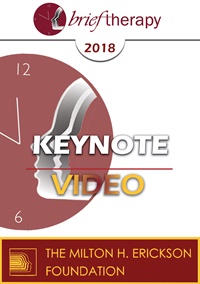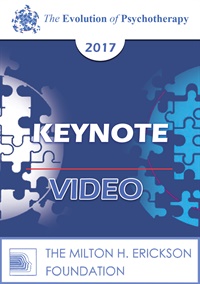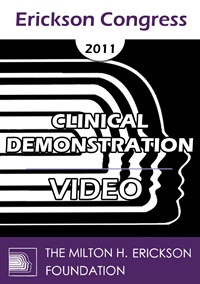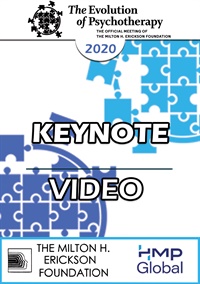
- Average Rating:
- Not yet rated
- Topic Areas:
- Art and Creativity | Training | Keynotes | Psychotherapy | Music | Therapist Development
- Bundle(s):
- EP20 Highlights
- Categories:
- Evolution of Psychotherapy | Evolution of Psychotherapy 2020
- Faculty:
- Jeffrey Zeig, PhD | Rob Kapilow
- Course Levels:
- Master Degree or Higher in Health-Related Field
- Duration:
- 1 hour 5 minutes
- Format:
- Audio and Video
- Original Program Date:
- Dec 10, 2020
- Short Description:
- At the heart of psychotherapy is the idea that listening to someone is an inherently healing act. Can an understanding of the grammar of music help us better understand the grammar of how patients communicate? Join NPR and PBS commentator Rob Kapilow for a unique exploration inside the language of music to see if it can help us learn to listen.
- Price:
-
Sale is $29.00
price reduced from Base Price - $59.00
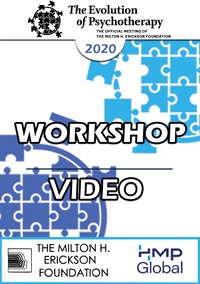
- Average Rating:
- Not yet rated
- Topic Areas:
- Trauma | Workshops | Art and Creativity | Social Psychology | Polyvagal Theory | Psychotherapy | Music | Psychology
- Categories:
- Evolution of Psychotherapy | Evolution of Psychotherapy 2020
- Faculty:
- Stephen Porges, PhD
- Course Levels:
- Master Degree or Higher in Health-Related Field
- Duration:
- 2 hours
- Format:
- Audio and Video
- Original Program Date:
- Dec 09, 2020
- Short Description:
- This presentation will focus on how Polyvagal Theory provides a plausible model to explain how and why intonation of voice and vocal music can support mental and physical health and enhance function during compromised states associated with illness, chronic stress, and trauma. The workshop will elaborate on the principles incorporated in the Safe and Sound Protocol™ and the lessons learned through preliminary clinical trials, current research, and feedback from clinicians applying the protocol to various clinical disorders including individuals with severe trauma histories.
- Price:
-
Sale is $29.00
price reduced from Base Price - $59.00
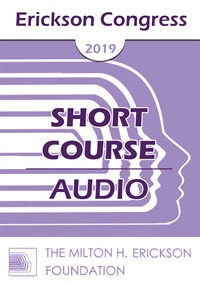
- Average Rating:
- Not yet rated
- Topic Areas:
- Short Courses | Art and Creativity | Hypnosis | Ericksonian Hypnosis and Therapy Techniques | Hypnotherapy | Music | Attunement
- Categories:
- Erickson Congress | Erickson Congress 2019
- Faculty:
- Anita Jung, M.S.
- Duration:
- 1 Hour 27 Minutes
- Format:
- Audio Only
- Original Program Date:
- Dec 12, 2019
- Short Description:
- The Greek philosopher Pythagoras was among the first to recognize the healing powers of music. Milton Erickson, the musician of mind, body and soul, was the first to structure communication for greatest effect so that clients could change many aspects of their life, not merely their presenting symptoms. Just as the cadence of voice and patterns of speech form the music of Ericksonian communication, repetition and rhythm create the emergence of a trance state in music, film, and in poetry. The utilization of art and creativity in a hypnotherapy model functions as a catalyst accentuating the nuances of core competencies such as tailoring, utilization, strategic approach, and destabilization.
- Price:
- $15.00 - Base Price
Credit available - Click Here for more information
- Average Rating:
- Not yet rated
- Topic Areas:
- Keynotes | Trauma | Brief Therapy | Meditation, Spirituality and Yoga | Post-Traumatic Stress Disorder (PTSD) | Music
- Bundle(s):
- Learning Track - Turn Down the Trauma
- Categories:
- Brief Therapy Conference | Brief Therapy Conference 2018 | Online Continuing Education
- Faculty:
- Bessel van der Kolk, MD
- Course Levels:
- Master Degree or Higher in Health-Related Field
- Duration:
- 1:06:32
- Format:
- Audio and Video
- Original Program Date:
- Dec 06, 2018
- Short Description:
- This workshop will show how trauma affects the developing mind and brain, and teach how trauma affects self-awareness and self-regulation. We will focus on the fundamental difference between trauma desensitization vs. integration and growth, and look at the difference between disrupted attachment and traumatic stress. We will examine the role of interpersonal rhythms and attunement in establishing a sense of self and community. This workshop will discuss and demonstrate affect regulation techniques, examine ways to deal with fragmented self-experience, and teach the benefits of yoga, EMDR, meditation, neurofeedback, music and theater.
- Price:
-
Sale is $29.00
price reduced from Base Price - $59.00
Credit available - Click Here for more information
- Average Rating:
- Not yet rated
- Topic Areas:
- Keynotes | Art and Creativity | Music | Psychotherapy | Therapist Development
- Categories:
- Evolution of Psychotherapy | Evolution of Psychotherapy 2017 | Online Continuing Education
- Faculty:
- Rob Kapilow
- Course Levels:
- Master Degree or Higher in Health-Related Field
- Duration:
- 1:35:16
- Format:
- Audio and Video
- Original Program Date:
- Dec 14, 2017
- Short Description:
- At the heart of psychotherapy is the idea that listening to someone is an inherently healing act. Can an understanding of the grammar of music help us better understand the grammar of how patients communicate? Can Mozart help transform how we listen? Join NPR and PBS commentator Rob Kapilow [or conductor/composer/author--whichever you think is better] for a unique exploration inside the language of music to see if it can help us learn to listen like Mozart.
- Price:
- $0.00 - $29.00
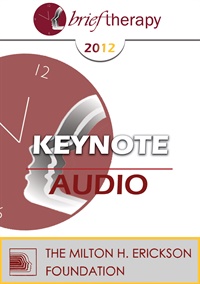
- Average Rating:
- Not yet rated
- Topic Areas:
- Keynotes
- Categories:
- Brief Therapy Conference | Brief Therapy Conference 2012
- Faculty:
- Robert Greenberg, PhD
- Duration:
- 1:58:07
- Format:
- Audio Only
- Original Program Date:
- Dec 06, 2012
- Short Description:
- BT12 Keynote 02 – Beethoven: Revolution, Reinvention, and Innovation with Attitude! – Robert Greenberg, PhD Louis (Ludwig) van Beethoven (1770-1827) was product of a violently dysfunctional upbringing. In the fall of 1802, at just the time his name and fame were beginning to spread across Europe, he suffered a suicidal depression. Through equal parts self-delusion and sheer will, Beethoven managed to reinvent himself personally and artistically as a hero battling fate itself. Thus armed, he emerged from his funk in early 1803, and proceeded to create a body of work unlike anything anyone had ever before imagined. Central to Beethoven’s new compositional vision was his conviction that his music be a vehicle for profound self-expression: his therapist’s couch. This program will explore Beethoven’s life and times and will then focus on his Symphony No. 5 as an example of how a piece of instrumental music can become—literally—a highly personalized confessional.
- Price:
- $15.00 - Base Price
Tags: Music Art and Creativity
- Average Rating:
- Not yet rated
- Topic Areas:
- Keynotes | Art and Creativity
- Categories:
- Erickson Congress | Erickson Congress 2011
- Faculty:
- Jeffrey Zeig, PhD
- Course Levels:
- Master Degree or Higher in Health-Related Field
- Duration:
- 48:47
- Format:
- Audio and Video
- Original Program Date:
- Dec 11, 2011
- Short Description:
- Expressive elements in the work of Beethoven and Erickson will be compared. Mood and perspective are impacted by expressive elements, not by information.
- Price:
-
Sale is $29.00
price reduced from Base Price - $59.00
Tags: Art and Creativity Music
- Average Rating:
- Not yet rated
- Topic Areas:
- Clinical Demonstrations | Hypnosis | Meditation, Spirituality and Yoga
- Categories:
- Erickson Congress | Erickson Congress 2011
- Faculty:
- Michael Yapko, PhD
- Course Levels:
- Master Degree or Higher in Health-Related Field
- Duration:
- 55:56
- Format:
- Audio and Video
- Original Program Date:
- Dec 10, 2011
- Short Description:
- Through story, music, and guided imagery, this hypnotic demonstration invites participants into a state of deep relaxation and personal reflection. Using rhythm, metaphor, and sensory awareness, the experience encourages an unfolding sense of inner peace, renewal, and connection. The session models how sound, silence, and symbolic storytelling can foster emotional integration, spiritual presence, and gentle movement toward growth and transformation.
- Price:
-
Sale is $29.00
price reduced from Base Price - $59.00
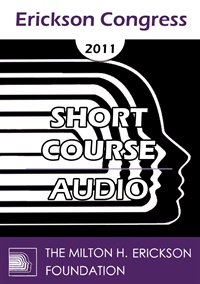
- Average Rating:
- Not yet rated
- Topic Areas:
- Short Courses | Art and Creativity | Brief Therapy | Consciousness | Unconscious Processes | Hypnosis | Resistance | Music
- Categories:
- Erickson Congress | Erickson Congress 2011
- Faculty:
- Alan Redstone, MA
- Duration:
- 1:25:54
- Format:
- Audio Only
- Original Program Date:
- Dec 09, 2011
- Short Description:
- Music is an effective Brief Therapy tool that can be used to instantly access right brain intelligence, elicit conscious and unconscious material for processing, and induce hypnotic states that render listeners receptive to positive suggestions of wellness, relaxation, and integration. A single short song can cut through resistance, setting the perfect atmosphere for a highly productive session.
- Price:
- $15.00 - Base Price
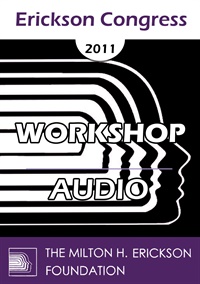
- Average Rating:
- Not yet rated
- Topic Areas:
- Hypnotherapy | Trance | Workshops | Art and Creativity | Ericksonian Hypnosis and Therapy Techniques | Music | Seeding | Mind-Body | Resistance
- Categories:
- Erickson Congress | Erickson Congress 2011
- Faculty:
- Anita Jung, M.S.
- Duration:
- 59 Minutes
- Format:
- Audio Only
- Original Program Date:
- Dec 07, 2011
- Short Description:
- Music within a hypnotherapy model functions as a catalyst accentuating the nuances of seeding, guiding associations, and deepening trance states. Participants will experience and practice how to musically transform mood states, utilize music creatively and effectively within a hypnotherapy session, and explore the latest research on the melody-mind-body link.
- Price:
- $20.00 - Base Price
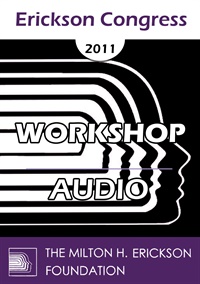
- Average Rating:
- Not yet rated
- Topic Areas:
- Workshops | Resistance | Art and Creativity | Ericksonian Hypnosis and Therapy Techniques | Music
- Categories:
- Erickson Congress | Erickson Congress 2011
- Faculty:
- Bruce Gregory, PhD
- Duration:
- 59 Minutes
- Format:
- Audio Only
- Original Program Date:
- Dec 07, 2011
- Short Description:
- This workshop will explore the expanding role of creativity in the treatment of resistance. It will integrate Erickson’s resistance protocol with principles from physics and classical music composition theory. Five major components of Erickson’s protocol: validation, the experience of failure, motivation, the conscious/unconscious polarity, and the experience of uncertainties with respect to the lessening of the patient’s defenses will be integrated with the concepts of mass, momentum, motion, position, time, creative repetition and harmony.
- Price:
- $20.00 - Base Price

- Average Rating:
- Not yet rated
- Topic Areas:
- Hypnosis | Workshops | Anger | Art and Creativity | Ericksonian Hypnosis and Therapy Techniques | Music
- Categories:
- Erickson Congress | Erickson Congress 2011
- Faculty:
- Albina Tamalonis, PsyD
- Duration:
- 59 Minutes
- Format:
- Audio Only
- Original Program Date:
- Dec 07, 2011
- Short Description:
- Ericksonian hypnotic techniques, potentiated by music, can help the angry patient learn a nonreactive relationship to their anger. The science of music physiology and research that supports the efficacy of recording your hypnosis will be presented. The legal and “fair use” of music on CD’s will be explained. Listening to hypnosis with music will allow attendees to experience this calming effect for themselves.
- Price:
- $20.00 - Base Price

- Average Rating:
- Not yet rated
- Topic Areas:
- Workshops | Ericksonian Hypnosis and Therapy Techniques | Therapeutic Relationship | Art of Psychotherapy
- Categories:
- Erickson Congress | Erickson Congress 2007
- Faculty:
- Betty Alice Erickson, MS, LPC, LMFT
- Duration:
- 1:41:54
- Format:
- Audio Only
- Original Program Date:
- Dec 06, 2007
- Short Description:
- Explore the art of therapeutic connection through right-brain engagement, storytelling, and naturalistic trance. Blending Carl Rogers’ reflections, vivid clinical stories, and experiential exercises, the session demonstrates how presence, credibility, and emotional investment create healing beyond technique. Through guided practice in trance-based storytelling and connection exercises, clinicians learn how offering their authentic selves can deepen rapport, foster trust, and transform the therapeutic encounter.
- Price:
- $15.00 - Base Price
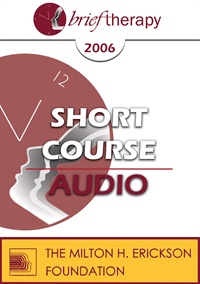
- Average Rating:
- Not yet rated
- Topic Areas:
- Short Courses | Art and Creativity | Brief Therapy | Meditation, Spirituality and Yoga | Music
- Categories:
- Brief Therapy Conference | Brief Therapy Conference 2006
- Faculty:
- Harvey Wasserman, MD
- Duration:
- 1:18:05
- Format:
- Audio Only
- Original Program Date:
- Dec 07, 2006
- Short Description:
- Balancing the emotions and a transformational visualization are two visualizations that permit patients to actively work on pressing life issues during and between therapy sessions. Each visualization will finish with a musical composition by Ray Lynch that enhances the effectiveness and purpose of the visualization.
- Price:
- $15.00 - Base Price
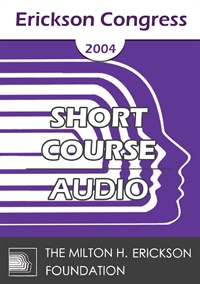
- Average Rating:
- Not yet rated
- Topic Areas:
- Short Courses | Ericksonian Psychotherapy | Interspersal | Tailoring | Utilization | Art and Creativity | Trance | Ericksonian Hypnosis and Therapy Techniques | Music
- Categories:
- Erickson Congress | Erickson Congress 2004
- Faculty:
- Maria Escalante de Smith, MA
- Duration:
- 1:18:14
- Format:
- Audio Only
- Original Program Date:
- Dec 02, 2004
- Short Description:
- Ericksonian psychotherapy emphasizes the importance of tailoring. In this workshop, we will learn how to utilize sung trances where the client's own vocabulary, interspersal and future orientation will be used. Brief interventions will be presented while using sung trances and participants will learn how to compose their own interventions using music and hypnotic language. Audience participation will be invited.
- Price:
- $15.00 - Base Price


